JAMIE Oliver’s Del-Boy style preaching about 'practical food education' and home cooked dinners for a ‘fivah’ has fallen on deaf ears in Britain.
As long as you have a working kitchen you have the means to cook healthily...
“Whack your leftovers in the pan,” he says. "It’ll be bootiful... Pukka!" While the celebrity chef and food maverick has committed himself to curing Britain's obesity epidemic head-on, our waistlines continue to runneth-over our belt buckles.
And here’s where the well-formed excuses pile in.
New independent research, based on a study of 2000 people, claim 51% of Brits feel that ‘healthy food is too expensive’. The results showed that the average Brit spends £248.05 per month on junk food, whilst spending on average just £67.59 per month on healthy food. All of the people questioned were in full time employment but considered fruit, vegetables and organic foods as luxury purchases.
What is fuelling this misconception?
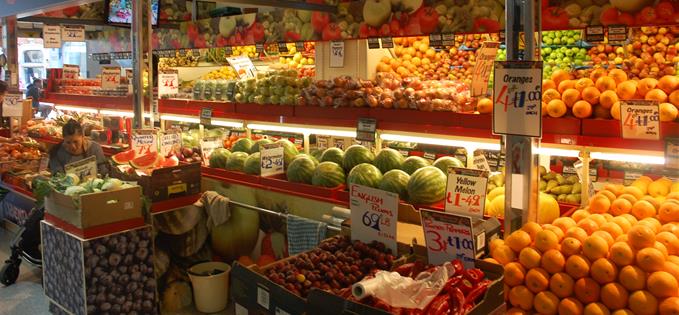 Manchester Arndale Market
Manchester Arndale MarketToday in Britain, obesity is considered the poor man’s problem and slimness a luxury of the rich (and fat in the pocket). Or so said Anna Soubry the Conservative MP back in 2013, who was later criticised for stigmatising Britain’s poor. It’s a stigma sensationalised by the media’s distasteful fixation for benefits-scroungers and down-and-outs (taking our taxing taxes and gorging on our food). The Daily Mail recently picked 26-year-old Christina Briggs as the face of this new ‘epidemic’. Briggs is 25 stone, unemployed, on benefits and blames the cost of healthy food for her size.
'Pay me more,' she said, 'and I’ll lose weight.'
Briggs may be an extreme case but her attitude to food and money provoke some to brand all of Britain's poor and obese as mollycoddled, spoiled and lazy. Others join Jamie Oliver's cry for more education.
Yet, when you skim over the largely patronising research that suggests the mid-to-lower classes can’t tell a courgette from corn on the cob, it’s not difficult to see that Britain’s eating problem may not always be about education but more from a lack of funds. The UK has seen a rise in more extreme cases of poverty when over one million Brits have resorted to food banks to help sustain their family. When funds are low we can’t be too picky about calorie-counting.
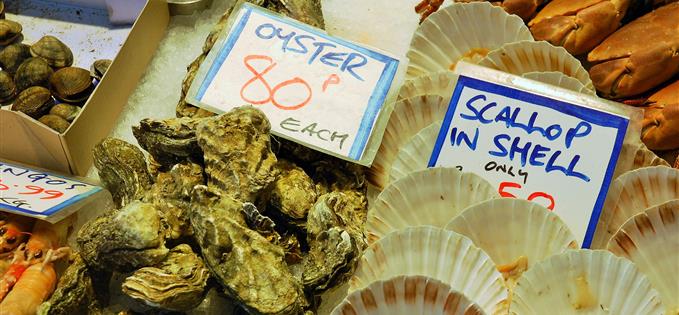
"I earn enough money but I still struggle to eat healthy food and I still find it expensive," says 37-year-old Mancunian, Steve Brannigan.
"A lot of the local grocers have disappeared in Manchester and supermarkets are just far more convenient. A basket full of fruits, vegs and organic foods amounts up far more than junk food. If you're lucky to live in Chorlton or Didsbury you'll benefit from grocers on your doorstep and it's much cheaper."
For argument’s sake, healthy foods, while not notably more expensive, are largely perishable and cost more in the long run to replace. You can stock pile canned goods and baked beans to last for yonks (you can also leave your supersized bottle of coke brewing in the cupboard for up to a year).
Of course, this is where the excuses end. And excuses are simply that.
Does your run-of-the-mill chicken masala from your local takeaway really cost less than a home-made and healthy meal? No.
“As long as you have a working kitchen you have the means to cook healthily. You can create entire meals for under a fiver – absolutely,” says McCall’s long-standing greengrocer on Church Street. The longest running market in Manchester City Centre.
“It’s absolutely rubbish. Spring onions are 50p, tomatoes 50p, potatoes are £8.99 for the kilo, that could probably feed a family for an entire week,” he adds.
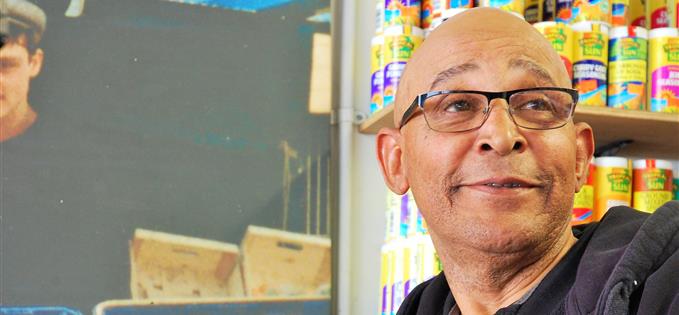 "You can create entire meals for under a fiver – absolutely"
"You can create entire meals for under a fiver – absolutely"McCall’s has been supplying fruit and veg in Manchester for nearly 100 years. The greengrocer has seen war and recession twice over and its owner believes fruit and veg is cheaper than ever.
Pointing to a black and white photograph McCall says, “Onions were 15p 38-years-ago, today they’ve gone up by 15p. I’d still say this is dirt cheap.”
“There’s no excuses. People can shop in places like Aldi – they can be incredibly cheap, but we’re still even cheaper. People need to make the effort to look. The supermarket is designed to make you shop more and buy things you don’t need. Be wise and shop locally.”
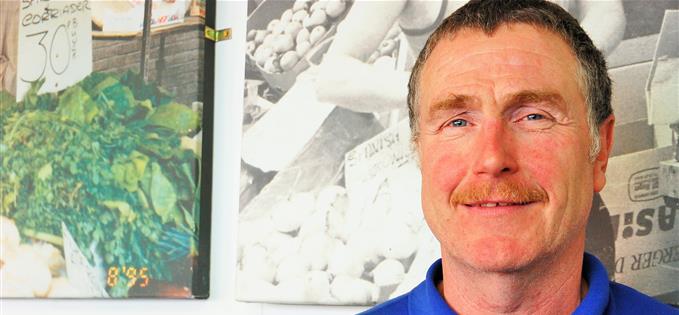 "Theres no excuses," says Andy McCall, owner of one of Manchester's oldest grocers
"Theres no excuses," says Andy McCall, owner of one of Manchester's oldest grocersAgain education seems to be the message. Grocers Kaz and Ally, run the organic outfit next door and strictly source organic and vegetarian produce.
"There’s lots of information out there on how to cook healthily and the information is free. Tips such as freezing food go a long way and helps stop wastage," says Ally
Ally adds: “It’s mainly western culture that seems to suggest you must eat meat every day, when you could happily survive on meat once a week. Vegetables are very cheap.”
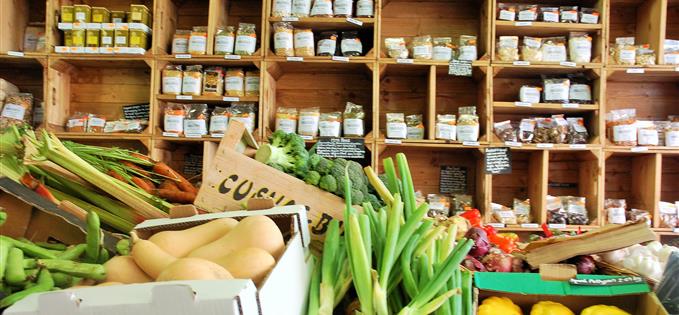 McCall's Organic grocers
McCall's Organic grocersShopping locally, from the butchers to the grocers, is the smart way of eating healthier and thwarting costs. The truth is Britain likes and prefers junk food. No bones about it. In the same research by Voucher Codes, 71% Brits claim they just buy junk food because 'it tastes better'. Also in our fast paced times, when everything is accessible via app, convenience is the major factor in whether people eat healthily or not.
With supermarkets constantly in price-slashing wars it seems wrong to blame convieniently located supermarkets for our money-weight problem. It comes down to 'can't cook, won't cook'.
“It takes a lot more thinking and more preparation to cook healthy food, especially to do it cheaply," says Ally. "But there seems to be a food revolution at the moment and a return to home cooking and home cooked meals. It takes more preparation but it certainly is cheaper."
If the issue is really one of money, it doesn't explain the rise in dirty food restaurants in Manchester and beyond. Put an expensive, grotesquely unhealthy burger on the menu and punters swarm, spend and gorge.
So yes, unbuckle your belt and eat junk food if you wish, but don't blame tight purse strings for your bad diet.
Follow @LOreal_B on Twitter
Find McCall's greengrocer and McCall's Organics on Church Street, Northern Quarter, M4 1PN.
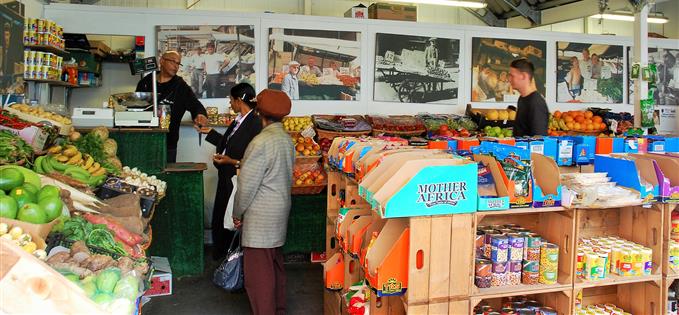
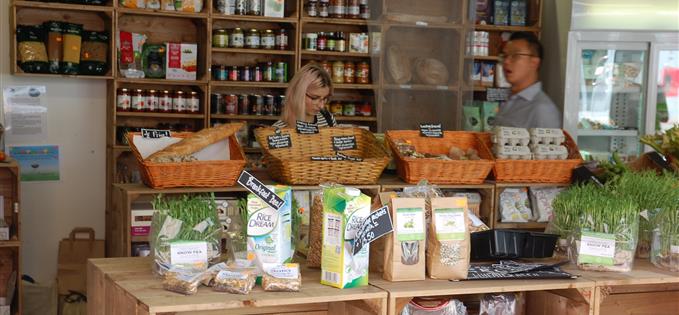
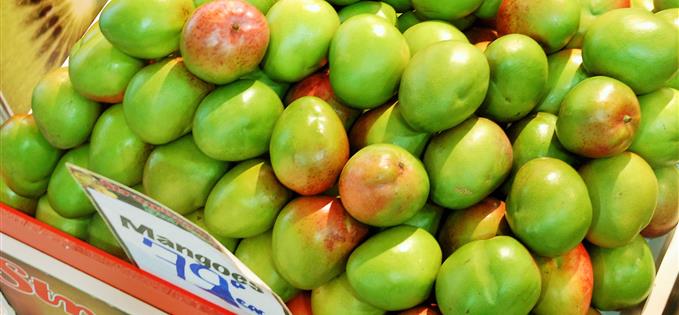
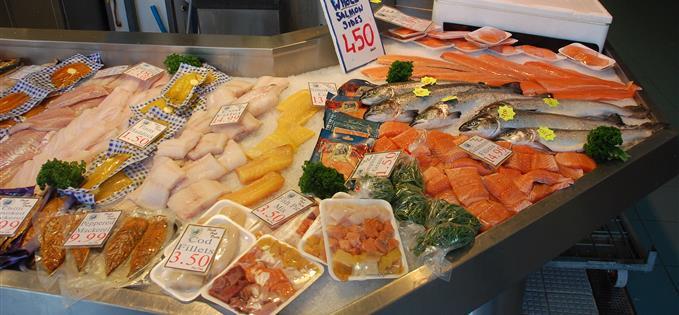
 Manchester Arndale Market
Manchester Arndale Market









